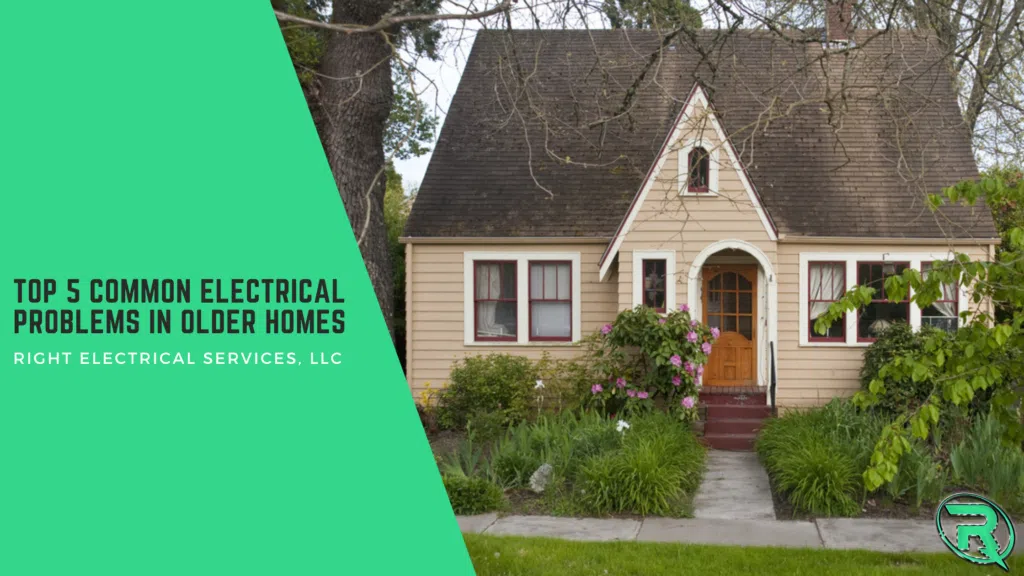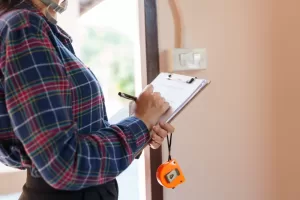Top 5 Common Electrical Problems in Older Homes
Older homes are full of charm, character, and history, but they often come with their own set of challenges—especially when it comes to electrical systems. If you live in an older home, it’s vital that you are aware of potential electrical issues that may not only affect your safety but also increase your energy costs.
Here at Right Electrical Services, we believe in the importance of staying proactive about your home’s electrical system. When you own an older home, however, staying on top of potential problems is even more crucial. Today, our electricians will be walking you through the top five most common electrical problems you might encounter in an older home so that you can address issues before they snowball into potentially dangerous (and more expensive) problems.
1. Outdated Wiring (Knob-and-Tube or Aluminum Wiring)
Many older homes still use knob-and-tube wiring or aluminum wiring, both of which can pose significant safety risks. Knob-and-tube wiring, commonly installed in homes built before the 1940s, lacks a ground wire, increasing the risk of electrical fires. Aluminum wiring, which became popular in the 1960s and 70s, tends to overheat, creating fire hazards, especially where wires are joined with other materials.
How to Address Outdated Wiring Issues in Older Homes
If your home has these outdated wiring systems, it’s best to hire a licensed electrician for a thorough inspection. They can recommend rewiring or retrofitting your system with safer materials like copper.
2. Insufficient Electrical Capacity
Older homes were not designed to handle the modern electrical load of today’s technology-driven world. You might notice issues like flickering lights or tripped breakers when running multiple appliances or devices. This is a sign that your electrical panel doesn’t have enough capacity to support your home’s power demands.
How to Address Insufficient Electrical Capacity Problems in Older Homes
Upgrading your electrical panel to a 200-amp service can increase your home’s power capacity and prevent overloading circuits. This upgrade is crucial if you’re adding large appliances, HVAC systems, or considering an electric vehicle charger.
3. Ungrounded Outlets
Homes built before the 1960s typically feature two-prong outlets, which lack the grounding necessary to protect your electronics and reduce the risk of electrical shock. If you’re still using two-prong outlets, you could be putting both your devices and your family at risk.
How to Fix Problems With Ungrounded Outlets in Older Homes
Replacing these outdated outlets with three-prong, grounded outlets is essential. A qualified electrician can help rewire your outlets to ensure they meet modern safety standards.
4. Old or Faulty Electrical Panels
An old electrical panel may not only be inefficient but also dangerous. Brands like Federal Pacific and Zinsco, which were common in the mid-20th century, have been known to fail, leading to potential fire hazards. Signs of a faulty electrical panel include flickering lights, tripped breakers, or strange noises.
Fixing Problems With Old or Faulty Electrical Panels in Older Homes
If your home has an outdated or faulty electrical panel, replacing it is crucial for your safety. A new, modern panel will be more efficient, reduce the risk of electrical fires, and better meet the demands of modern electronics and appliances.
5. Lack of GFCI Outlets
Older homes often lack Ground Fault Circuit Interrupter (GFCI) outlets, which are essential in areas with high moisture levels like bathrooms, kitchens, and outdoor spaces. GFCIs help prevent electrical shocks by cutting off the power when a ground fault is detected.
Dealing With a Lack of GFCI Outlets in Older Homes
Install GFCI outlets in areas prone to moisture to meet today’s electrical code requirements. A professional electrician can easily install these outlets to help keep you and your home safe.
Why Older Homes Need Regular Electrical Inspections
Regular electrical inspections are crucial for older homes because they help identify potential safety hazards that can arise from outdated wiring, faulty electrical panels, or worn-out components. Over time, the electrical systems in older homes may deteriorate or become inadequate for modern energy demands, increasing the risk of electrical fires, shocks, or power outages.
Inspections by a licensed electrician ensure that your home’s wiring and electrical components are up to code, preventing costly repairs and improving overall safety. Additionally, inspections can help homeowners spot energy inefficiencies, saving money on utility bills and reducing the need for emergency electrical work.
Prioritize Safety and Efficiency in Your Older Home
If you’re living in or considering buying an older home, it’s crucial to address these common electrical problems. While the charm of an older house is undeniable, safety should always come first. Regular electrical inspections by a licensed electrician will not only keep your home safe but can also improve energy efficiency, reducing your electric bills.
At Right Electrical Services, we specialize in diagnosing and repairing electrical issues in older homes. Whether you need an inspection, rewiring, or an electrical panel upgrade, we’re here to help keep your home safe and up to code. Contact us today to schedule an electrical inspection and ensure your home’s electrical system is running smoothly.









